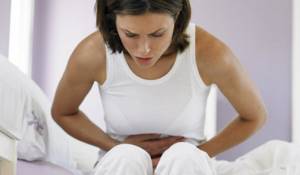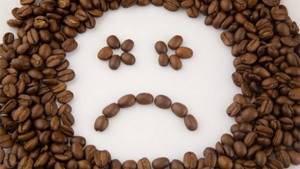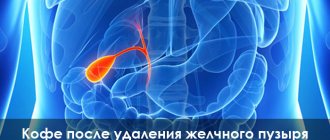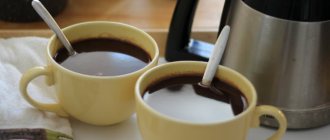Many people drink at least 2-3 cups of coffee a day. Previously, the drink was considered harmful, but in recent years scientists have found a lot of evidence that coffee is good for the body, prevents the development of many diseases, helps to lose weight, etc. In addition, in the modern rhythm of life, it helps to focus, concentrate, work and live more actively. But how much can you drink without harm, can you be poisoned by coffee and what kind, and what to do if the dose is too high? How to recognize the symptoms of coffee poisoning?
Can you get poisoned from coffee?
You can be poisoned by anything, and coffee in this case is no exception. True, this option is unlikely. This is usually closer to an overdose rather than actual poisoning, since coffee, as a rule, does not contain poison. There is an individual reaction to individual components, as well as exceeding reasonable consumption standards when too much caffeine enters the body.
Doctors report that most cases of caffeine poisoning occur as a result of taking stimulant pills and energy drinks, not from the coffee itself.
However, you can still get poisoned, especially in the following situations:
- If you have drunk too much coffee. A lot in this case is a subjective concept, but definitely more than you usually drink. Exceeding the dose by just one or two cups can lead to unpleasant consequences, especially if you are not used to such doses.
- If the body is weakened, the person has not had enough sleep, or is in a state of stress, the likelihood of coffee poisoning is much greater.
- If you drink coffee on an empty stomach, especially in situations where the body is weakened.
Symptoms of coffee overdose
Strictly speaking, there is no specific standard for coffee. For some, half a liter of strong drink is considered normal, but for others, even two small cups can make you feel bad. The effects of caffeine are very individual, even for one person. For example, changes in physical condition affect the body's perception of caffeine, and what was normal yesterday may become excess today.
For a tired, weakened or sick person, the coffee intake is reduced, but active physical activity increases the permissible dose.
The good news is that the symptoms of a coffee overdose can be quickly recognized. They can be implicit, weakly expressed. Most often they appear in the early stages of an overdose.
Early symptoms of overdose
- Facial redness. Perhaps this is the very first noticeable sign that there is already enough coffee. Blood flows strongly to the muscles, so the skin looks redder than usual.
- Excessive eye shine. The effect of adrenaline stimulates the functioning of all glands, including the lacrimal glands, so the eyes are more moisturized and reflect light more strongly.
- Feeling of heat in the body. It can be caused by blood flow to the muscles, excess adrenaline, and a sharp release of glucose into the blood from the liver, from where it is released by the same caffeine. The symptom can be sharp and strong, but quickly passing, or it can increase gradually.
- Trembling sensation in the limbs or throughout the body. The first stage of overdose will be characterized by nervous muscle contractions in certain areas. Your fingers may tremble, your knees may feel weak, or your calves may feel shaky. Often there is a feeling of internal tension, followed by trembling. As a rule, it begins to be perceived in the solar plexus and then spreads throughout the body.
- Cardiopalmus. The occurrence of this symptom is also due to too much adrenaline in the blood, which is released under the influence of caffeine.
- Dizziness. This symptom can manifest itself in quite a variety of ways, from a full-fledged sensation of the turbulence of the surrounding world, to the appearance of a faint veil before the eyes.
Early symptoms of overdose can occur as early as 15-20 minutes after drinking excess coffee, but it is easier to get rid of them.
Late symptoms of overdose
For their occurrence, it takes a little more time, during which the drink enters the stomach and begins to be absorbed.
- Nausea. Even a small cup of coffee on an empty stomach can cause it, especially if you are not an avid coffee drinker.
- Increased sweating. The intense work of the nervous system, together with a sharp change in muscle tone and the release of adrenaline, may well lead to such an unpleasant symptom. If you feel it, then begin to control your condition, paying attention to how you feel.
- Frequent urination. Coffee removes fluid from the body, so in large doses it acts as a diuretic. Caffeine reduces the kidneys' ability to absorb electrolytes, hence the worsening of diuresis.
- Gastrointestinal tract disorder. Options are possible here - from ordinary colic in the intestines to spasms. Caffeine constricts the blood vessels of the abdominal organs, hence the sensation of cramping. Often this reaction occurs to an unfamiliar type of coffee consumed in large quantities.
Acute phase symptoms
They are characteristic of a state of severe overdose, or rather, caffeine poisoning.
- Blue discoloration of the skin. It can be mild and start from the area around the eyes and in the nasolabial folds. Symptoms indicate a serious cardiac disorder.
- Hallucinations. They are also evidence of a complete imbalance in the body. Under the influence of a large proportion of a stimulating substance, the brain becomes overly excited and begins to distort visible reality.
- Insomnia. The symptom indicates that the nervous system has been subjected to severe stress and cannot return to its normal rhythm of functioning.
- Nervousness and irritability. This symptom is more typical for a constant small overdose; it rarely occurs immediately, more often it is a consequence of prolonged nervous stress in which the body is under the constant stimulating influence of caffeine.
Of course, not all symptoms can occur in one person during a coffee overdose, and the excess of the norm itself can vary, from small, completely safe, to critical, requiring hospitalization.
The average dose for the average person is 3-5 cups of regular espresso, each containing an average of 100 milligrams of caffeine. At the same time, it is necessary to take into account that homemade coffee, as a rule, is much stronger, and has a dosage of 120-130 milligrams per cup, while espresso from a coffee shop contains 100-110.
Scientists have found that coffee addiction occurs when drinking about 650-700 mg of caffeine per day for a long time (more than 3 weeks), which corresponds to 6-7 cups of espresso.
Poisoning with natural and instant coffee
Natural coffee poisoning usually occurs due to an overdose. As an option, if a person usually drinks a weak instant drink, and then decides to drink a large cup of a strong natural one.
It is much easier to get poisoned with instant coffee. It is processed chemically, and the finished powder or granules usually contain up to 15-20% of the original grains. The rest is stabilizers, preservatives, emulsifiers, dyes, starch, synthetic additives, etc. The cheaper instant coffee is, the more dangerous it is to drink, since there is less and less natural product and more and more chemicals.
Decaffeinated coffee is also unsafe. Caffeine is washed out with chemical solvents, which are also present in minimal doses in the finished product. If the coffee is instant, it also contains all the dyes and preservatives described above.
Most often, people get coffee poisoning due to an individual reaction to artificial components or a combination of them. Therefore, you should not get carried away with an instant drink from an unknown brand if you are prone to allergic reactions or have diseases of the cardiovascular system.
You can get poisoned if you usually drink coffee with milk and suddenly drink black coffee.
Symptoms of poisoning
Initial signs of overdose occur 5-10 minutes after taking the aromatic drink:
- the face becomes red, the eyes “light up”;
- dizziness, general malaise;
- heavy shallow breathing;
- noticeable fever;
- there is an increased heart rate and possible pain;
- trembling of the arms, legs or whole body.
With prolonged poisoning or stable intake of increased amounts of coffee, symptoms are observed:
- increased sweating, body heat;
- vomiting, nausea;
- frequent urge to urinate;
- feeling of pain in the gastrointestinal tract, diarrhea, abdominal cramps.

In case of sudden caffeine intoxication (this happens mainly due to energy drinks or pills), acute symptoms are possible:
- hallucinations, delusional state;
- convulsions;
- cyanosis of the face (especially around the eyes and lips);
- increased nervousness, irritability;
- secretion of cold sticky sweat.
With severe intoxication, hallucinations occur; this phenomenon is due to the strong activation by caffeine of some brain systems and the sudden slowdown of others. The most difficult sign of poisoning is cyanosis, the occurrence of which indicates a serious disorder of the cardiovascular system.
In case of severe overdose, coma, respiratory or heart failure may occur, resulting in death.
Symptoms of coffee poisoning
The first symptoms usually appear within 5-10 minutes after drinking your favorite drink:
- The face turns red from the rush of blood;
- The eyes sparkle;
- Feeling dizzy and weak;
- Heat is felt in the body, it can be sharp or increase gradually;
- The body or limbs may tremble, individual muscles or eyes may twitch;
- The heart beats faster and faster, pain may be felt;
- Breathing is shallow and it can be painful to inhale.
With prolonged intoxication of the body or stable consumption of large amounts of coffee, the following symptoms may occur:
- Nausea or vomiting;
- Stomach upset, diarrhea, cramps;
- More frequent urination in small volumes;
- Body heat, increased sweating.
With a sudden overdose of caffeine (usually from pills or energy drinks), acute phase symptoms may appear:
- The face turns sharply blue, especially around the lips and lips, the area under the eyes;
- Convulsions appear;
- Sticky cold sweat;
- Excessive nervousness or nervousness;
- Hallucinations and delusions.
Coffee overdose: what to do
There is an opinion among coffee lovers that coffee in any dose is beneficial for the body. But it is not so. Indeed, in small, moderate doses, the drink saturates us with energy, vigor, improves the functioning of internal organs and improves our mood. However, if you get too carried away with tasting your favorite drink, you risk experiencing all the delights of a coffee overdose.
In today's article we will go into detail about what a coffee overdose is, what are its symptoms and how to help your body if you could not resist the temptation and drank too much of the invigorating elixir.
Let's talk about overdose symptoms
First, you should understand that there is no specific norm for coffee consumption. Some people think that its dose is 500 ml of the strongest coffee, while others feel uneasy after the second cup of a coffee drink slightly diluted with milk.
Remember that the effect of caffeine on the body is a very individual process. And this even applies to the same person. For example, if you are feeling differently today or have been actively involved in sports, then the portion that you drink regularly may not be suitable for you today.
Please note: for a tired and weak person with various diseases, the coffee intake is reduced. While for active people involved in sports, it may well be significantly higher.
The great news is that the symptoms of an overdose of your favorite drink are not so difficult to recognize. Mild signs make themselves felt even at an early stage of an overdose.
Early symptoms include the following:
- Facial redness. When you drink too much coffee, blood begins to flow more strongly to the muscles, which leads to redness. Faces. This alarm bell should be a signal for you that there is enough coffee for today and there is no point in further tasting.
- It also needs to be said about excessive shine in the eyes. You need to know that adrenaline stimulates the work of not only internal organs, but also glands. Therefore, when there is an excess of it, the lacrimal glands are actively involved in the process. Because of this, the eyes begin to become more moisturized and reflect light.
- Heat in the body. It has several reasons at once: adrenaline, actively produced by your body, and a sharp release of glucose into the blood, and increased blood flow to the muscles. It is noteworthy that sometimes the symptom can be sharp or, conversely, increase gradually.
- If there is an excess of coffee in the body, a person may feel trembling in the limbs or even in the whole body. In the early stages of an overdose, a coffee connoisseur notices the appearance of nervous muscle contractions in certain areas. Often a person’s fingers and calves tremble. You may feel very weak in your knees. Trembling alternates with increasing internal tension.
Attention: usually a person feels a trembling in the solar plexus, but then it actively spreads throughout the body.
- Frequent symptoms of overdose include rapid heartbeat. This is also due to too high levels of adrenaline, which in turn is caused by taking too much caffeine.
- Dizziness can manifest itself in several ways. Sometimes it can be quite small. It was as if a weightless, transparent veil appeared before a person’s eyes. Few people usually pay attention to such a symptom. Meanwhile, the situation continues to worsen.
It is important to know: the first symptoms indicating an overdose of this caffeine-containing drink appear 15-20 minutes after consuming an excessive dose of your favorite invigorating elixir.
Now let's talk about late symptoms of overdose
They usually take a little longer to appear. After all, the drink needs to get into the stomach and begin to be absorbed.
Signs of overdose in later stages include:
- Nausea. Oddly enough, even a small cup of coffee drunk on an empty stomach can lead to the appearance of such a symptom. This especially applies to people who drink coffee occasionally and are not avid coffee drinkers.
- This will be followed by increased sweating. This not very pleasant symptom is caused by the central nervous system being under tension, as well as a sharp change in muscle tone and the release of a large portion of adrenaline into the blood.
- The next sign is a frequent urge to urinate. Don't forget that coffee is a natural diuretic. Its effect is quite mild, but with an overdose of coffee it can be more active and act as a diuretic. This effect is explained by the fact that caffeine, entering the kidneys, begins to adsorb electrolytes. This is what explains the frequent urination.
- If there is an excess of coffee in the body, gastrointestinal upset may occur. By the way, both tolerable colic and severe spasms may appear. The latter is to blame for the ubiquitous caffeine, which leads to vasoconstriction of the abdominal organs.
Good to know: stomach upset can occur not only with an overdose of a caffeine-containing drink, but also after drinking a type of coffee previously unfamiliar to your body.
Acute phase symptoms
All of the following signs indicate not just an overdose of coffee, but real poisoning. These include:
- Blue discoloration of the skin. At the beginning, it can be expressed quite weakly (mainly localized in the eye area and nasolabial area). But then the blueness spreads to other areas of the face. This symptom clearly indicates serious disturbances in the functioning of the heart.
- Hallucinations also often appear when coffee is poisoned. Your body and brain are under a large amount of stimulant. And this leads to the fact that the latter begins to actively distort the reality around you.
- Insomnia indicates that the nervous system has been subjected to severe stress and is unable to return to its usual rhythm of functioning.
- Usually, nervousness and irritability make themselves felt with a slight overdose of coffee. It rarely makes itself felt immediately and has a so-called cumulative effect.
Please note: a person who overdoses on coffee may not experience all the symptoms. And the overdose itself can be different - both small (not at all critical), and such that a person needs hospitalization.
About the “dose” of coffee
The average dose for the average person is 3-4 cups of espresso. Each serving contains 100 mg of caffeine. But keep in mind that coffee prepared at home is generally stronger and the amount of caffeine in one serving is approximately 120-130 mg. While espresso from the nearest coffee shop is 100-110 mg.
This is interesting: you have probably heard more than once about addiction to coffee drinks. Scientists were able to determine that addiction occurs with regular consumption (for at least three weeks, 650-700 mg of caffeine) per day. If translated into servings, this corresponds to 6-7 cups of strong espresso.
What to do if you overdose on coffee
If you have discovered several symptoms in yourself or your loved ones or friends, then in this case you need to:
- Drink plenty of water. As you know, coffee helps dehydrate the body. Therefore, if you have symptoms of an overdose, you should drink plenty of fluids. If diarrhea is added to the symptoms, then you should add a little salt to the water. This trick will delay the removal of fluid from the body.
Please note: experts say that for one cup of coffee you need to drink the same amount of water.
- Eat a banana. Experienced baristas know that this fruit helps to get rid of tremors and remove internal tension. It's no secret that bananas contain a large dose of potassium, which has a beneficial effect on the cardiovascular system.
- Air baths. If you have a slight overdose of coffee, a walk in the fresh air will help you feel better.
- Lie down and open the window in the room. This method is suitable if you feel nauseous or dizzy.
Important: in more severe cases (when the skin turns blue and the person feels very bad), it is recommended to induce vomiting and then try to drink as much water as possible. If it doesn’t get better, be sure to go to the doctor! If a person with an overdose loses consciousness, it is necessary to call an ambulance and provide him with constant access to air.
A mild and not dangerous to a person (in the grand sense of the word) coffee overdose usually occurs during friendly get-togethers or visits to cozy but cramped coffee shops. That is, where there are a lot of people, there is little air and there is a strong coffee drink.
In order to avoid such unpleasant signs, which clearly indicate an overdose of your favorite drink, it is recommended to drink as much pure water without gas as possible. It also doesn’t hurt to order yourself an orange or any other fresh juice with citrus fruits and a few bananas. Be very attentive to your health, and then you will receive only joy and pleasure from drinking your favorite drink.

Coffee overdose: what to do

Number of votes: 804 3
5
1
804
Was the information helpful? Rate and leave a comment? Better yet, share!
Ayperi December 15, 2021, 20:36
I often drink coffee before deadlines for productivity, but this time it only made me more tired. Plus the heat in the body, accelerated heartbeat, I immediately thought it was because of the coffee.
Of course, there are many other reasons, for example, overwork, constant lack of sleep, lack of healthy foods in the diet, etc.
Lena December 03, 2021, 02:10
Muras, drink only natural - weak, medium, strong - depending on how you feel
Danila October 10, 2021, 10:07
It turns out you can fuck yourself with caffeine, wait for the trip report))
Dani 04 October 2021, 19:03
Thank you !!!
Muras September 23, 2021, 09:44
Even one cup of Nescafe makes me dizzy...
Comments
We will be glad if you share your opinion or add to a note or article.
How to deal with coffee poisoning?
The list of actions depends on what stage the person is in and how much coffee he drank:
- In the initial stage, if you feel sick 5-10 minutes after a cup of coffee, the best way to cleanse the body is vomiting. You can drink a glass of warm water and also induce vomiting. Provide fresh air flow. If you feel dizzy and weak, lie down or sit down. Drink water and try to breathe deeply. Usually after 15 minutes everything goes away, you may want to sleep.
- For more serious poisoning, if caffeine has already been absorbed into the stomach, or you have drank a lot of coffee over the past 24 hours, milk and banana, fresh air, as well as sorbents - activated carbon or any analogues - can help. You should give up coffee for several days.
- In the acute stage, it is best to call an ambulance. There is no antidote for coffee, so in a hospital setting they usually lower the blood pressure, monitor the condition, and administer medications to help remove toxins faster and prevent a critical condition.
What are the symptoms of a coffee overdose?

Early symptoms.
• Facial redness. The main sign that it's time to finish. The surface of the skin begins to turn red. This is due to the fact that caffeine affects the blood, which begins to circulate more strongly and flow to the tissues.
• Feeling of heat. Occurs for the same reason as facial redness. The effect may be sharp and strong, but not long lasting.
• Shining eyes. Since the action of adrenaline affects the tear glands, the eyes become more moisturized and reflect more light.
• Cardiopalmus.
• Dizziness. It manifests itself in different ways: from a slight haze before the eyes to a complete loss of coordination.
If at least two signs are present, then you should think about the fact that it’s time to stop...
Late symptoms. After the strong product enters the stomach and begins to be absorbed, symptoms of excessive consumption appear:
• Nausea.
• Heavy sweating. An unpleasant symptom can provoke an increased amount of adrenaline and increased functioning of the nervous system.
• Frequent urination. Coffee has a diuretic property, and since even small quantities remove water from the body, it can lead to dehydration.
• Disorders of the gastrointestinal tract. The reaction is different for each person: from mild discomfort to severe spasm.
Acute phase. Consequences of a severe overdose:
• Blue skin around the eyes and in the nasolabial folds. This sign indicates a disrupted process of heart activity.
• Hallucinations. Due to the action of a concentrated stimulant substance, the nervous system may incorrectly perceive the environment.
• Insomnia. In this case, the body shows that the brain is in an overexcited state and it is difficult for it to return to a normal rhythm of functioning.
• Aggressiveness and irritability. Such behavior speaks more of the prolonged nervous tension in which the body arrives due to constant stimulation by caffeine.
What to do if you overdose on coffee
At the first negative signs, after 5 - 10 minutes you can artificially induce vomiting to cleanse the stomach. Drink a lot of warm water and try to breathe deeply.
Water will also help restore the normal environment in the body. If you are severely dehydrated or have diarrhea, add salt to a glass of water. In this way you can retain water in the body.
A banana will relieve mild tremors and tension. The potassium contained in the product has a good effect on the functioning of the cardiovascular system.
A slow, gentle walk will be quite beneficial for a person. Facial redness and slight dizziness will go away. If it is not possible to go out into the fresh air, then you can lie down and open the window.
In the acute stage of poisoning, you must contact an ambulance.
In large cities, it is becoming increasingly difficult for a coffee lover to cope with his coffee addiction: every day new establishments are opening that attract with the aroma of a freshly brewed drink and “free croissant” promotions. As a result, humanity is experiencing chronic health problems that are common to the current generation.
If you cannot completely give up coffee, then reduce the amount of its consumption, do not make drinking the drink a pleasant ritual (getting together in a cafe with friends, lunch break, etc.), replace the product with other natural invigorating drinks.
Conclusions:
- Natural coffee does not contain poisons, and you can only get poisoned if you exceed the usual dosage.
- Instant coffee often causes poisoning, since most of its composition is chemical components, to which there can be an individual reaction.
- Poisoning from one cup of coffee usually goes away within 15-20 minutes.
- If a person is very ill and the nasolabial triangle turns blue, it is necessary to call an ambulance.
- People usually don't die from coffee poisoning.











